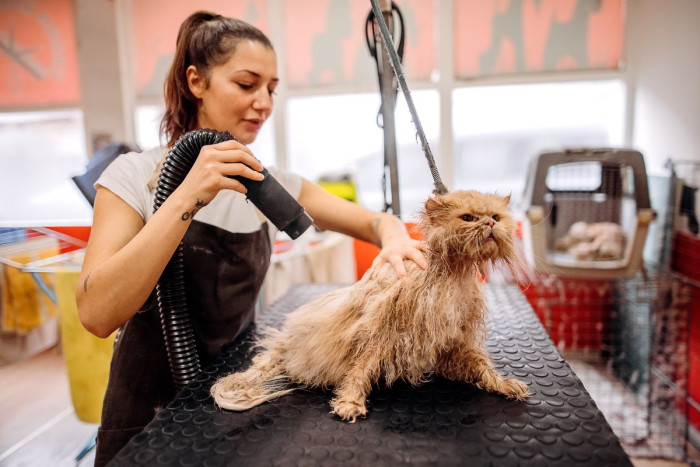Pet Groomer
Kaiwhakapaipai Mōkai
Alternative titles for this job
Pet groomers clean, trim and shape the hair and nails of animals in salons, mobile grooming vans and pet shops.
Pay
Pet groomers usually earn
$24-$30 per hour
Source: Careers.govt research, 2023.
Job opportunities
Pay
Pay for pet groomers varies depending on qualifications and experience.
- New pet groomers usually start on minimum wage.
- Experienced pet groomers can earn up to $30 an hour.
Pet groomers may also earn commission.
Income for self-employed pet groomers depends on the success of their business.
Source: careers.govt research, 2023.
- PAYE.net.nz website - use this calculator to convert pay and salary information
- Employment New Zealand website - information about minimum wage rates
(This information is a guide only. Find out more about the sources of our pay information)
What you will do
Pet groomers may do some or all of the following:
- consult with pet owners about their requirements
- de-knot and brush animal hair
- bathe, shampoo and dry animals
- trim, shave, shape and dye fur
- trim and paint animals' nails
- empty dogs’ anal glands
- clean, inspect and maintain the salon and cages
- sell animal care products
- make records and carry out office work.
Pet groomers who run their own businesses may also do tasks such as marketing, managing staff and keeping accounts.
Skills and knowledge
Pet groomers need to have:
- animal-handling skills
- animal-grooming skills
- knowledge of suitable cuts for each type of breed
- knowledge of animal diseases.
Working conditions
Pet groomers:
- may work varied hours on week days or weekends
- work in salons, shops, homes or mobile vans
- work in conditions that can be hot, noisy, dirty or smelly
- may work in conditions that are hazardous such as animals with contagious diseases.
Entry requirements
There are no specific requirements to become a pet groomer.
However, some employers prefer you to have at least one of the following:
- experience working in a pet grooming salon
- a qualification such as a New Zealand Certificate in Animal Management (Level 4) with a strand in Pet Grooming.
Secondary education
There are no specific secondary education requirements to become a pet groomer. However, biology is useful.
Personal requirements
Pet groomers need to be:
- practical
- caring towards animals
- able to pay attention to detail
- responsible and able to follow instructions
- good communicators as they may have to deal with demanding pet owners
- patient and calm.
Useful experience
Useful experience for pet groomers includes:
- paid or volunteer work with animals
- cleaning experience
- customer service experience
- hairdressing or nail salon experience.
Physical requirements
Pet groomers need to have a good level of fitness and strength, as they may need to lift heavy animals. They should not have any breathing problems or allergies to animals.
Check out related coursesWhat are the chances of getting a job?
Not enough pet groomers to meet demand
Demand for trained, experienced pet groomers is growing each year because:
- people are spending more money on their pets
- designer dog breeds are popular, and many of these dogs need regular grooming
- fewer pet owners are willing to groom their pets themselves
- not enough people are training to be pet groomers.
Many pet grooming businesses are hiring people from overseas to meet demand.
According to the Census, 714 pet groomers worked in New Zealand in 2018.
Chances best for trained pet groomers
Chances are best for pet groomers who have completed a grooming course and gone on to do at least three months of training in a grooming salon. This is because most pet groomers are too busy to give on-the-job training.
Types of employers varied
Pet groomers may work for:
- grooming salons
- veterinary clinics
- mobile grooming businesses
- shops that sell products for animals.
They may also set up their own businesses.
Sources
- Allpress, K, 'Pet Grooming Business Booming in Timaru', 22 December 2017, (www.stuff.co.nz).
- Anderson, A, North Island co-ordinator, National Dog Groomers Association of New Zealand, careers.govt.nz interview, June 2018.
- Gooch, C, 'Dog Groomers Going Barking Mad', 1 February 2018, (www.stuff.co.nz).
- Greencross, 'Greencross Annual Report 2017', 2018, (www.greencrosslimited.com.au).
- Jim's Dog Wash, 'Customer Demand Surges as Jim's Dog Wash Approaches 2018', 26 December 2017, (www.jimsdogwash.co.nz).
- Ineson, J, 'Dog Grooming a Lifestyle for Christchurch's Best in the Business', 30 March 2017, (www.stuff.co.nz).
- New Zealand Herald, 'What's a Pet Worth? $1.8b, Say Kiwi Animal Lovers', 1 January 2018, (www.nzherald.co.nz).
- Stats NZ, '2018 Census Data', 2019.
(This information is a guide only. Find out more about the sources of our job opportunities information)
Progression and specialisations
Pet groomers may progress to set up their own grooming businesses, or move into management roles.
With further training they may become animal care attendants, veterinary nurses or veterinary technicians.
Last updated 25 March 2025

